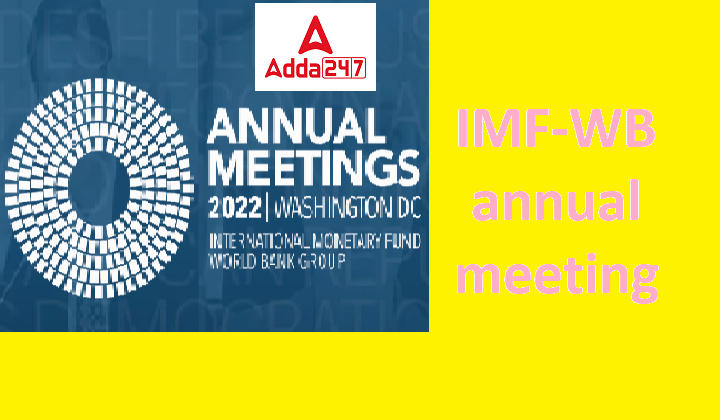Table of Contents
Why in news?
- Union Finance Minister Nirmala Sitharaman will travel to the United States on October 11 to attend the annual meetings of the International Monetary Fund (IMF) and the World Bank.
- The 2022 Annual Meetings of the International Monetary Fund (IMF) and the World Bank Group (WBG) will take place in person from Monday, October 10, through Sunday, October 16 in the IMF and World Bank Group headquarters, in Washington DC.
What is the IMF-WB annual meeting?
- The Annual Meetings are usually held for two consecutive years at the IMF and World Bank headquarters in Washington, D.C. and every third year in another member country.
- The 2022 Annual Meetings of the Boards of Governors of the World Bank Group and the IMF are scheduled to be held in Washington, D.C., during the week of October 10-16, 2022.
- The Board of Governors for each institution consists of one governor from each of the institutions’ member countries, typically the finance minister, central bank governor, or minister of development.
- During the Annual Meetings, the Boards of Governors decide on major policy issues related to the future work of the two institutions, which are subsequently implemented by their respective Executive Boards.
What’s on the agenda?
- At the heart of both the Annual and Spring Meetings are the meetings of the DC and IMFC, which discuss progress on the work of the World Bank Group and the IMF.
- The IMFC advises and reports to the IMF’s Board of Governors and will discuss the outlook for the global economy, developments in financial markets, as well as other pressing issues within the IMF’s mandate.
- The DC advises the Board of Governors of the World Bank and the IMF on critical development issues and on the financial resources required to promote economic development and poverty reduction in developing countries.
- At the conclusion of each of these meetings, communiqués are released that will provide important guidance to the Executive Boards of the two institutions.
The annual meeting in the shadow of unprecedented challenges
- The impacts of the ongoing economic crisis continue to bear down on nearly all facets of the global economy – pushing more people into poverty and impacting lives and incomes around the world.
- The pandemic has forced roughly 70 million more people into extreme poverty and global median incomes declined for the first time since measurements began in 1990.
- Further complicating these global development challenges are the effects of the high food, fuel, and fertilizer prices rippling through the supply chains of an interconnected world, creating global disruptions and battering incomes and livelihoods – especially among the poorest and most vulnerable populations around the globe.
What is the IMF?
- The IMF is an international organisation with 190 member countries. They work together to try to stabilise the global economy.
- Any country can apply to join, as long as it meets a few requirements.
- These include providing information about its economy and paying in a sum of money called a quota subscription. The richer the country, the larger its contribution.
- The IMF does three main things to monitor and support the economy:
- Tracking economic and financial events. It monitors how countries are performing and potential risks, like trade disputes or the uncertainty caused by Brexit
- Advising its members on how to improve their economies
- Issuing short-term loans and assistance to countries who are struggling
- These loans are mainly funded by quota subscriptions. In 2018, Argentina received the largest loan in the IMF’s history at $57bn (£53.4bn).
The World Bank
- Founded in 1944 at the UN Monetary and Financial Conference (commonly known as the Bretton Woods Conference), which was convened to establish a new, post-World War II international economic system, the World Bank officially began operations in June 1946.
- The World Bank Group comprises five constituent institutions: the International Bank for Reconstruction and Development (IBRD), the International Development Association (IDA), the International Finance Corporation (IFC), the Multilateral Investment Guarantee Agency (MIGA), and the International Centre for Settlement of Investment Disputes (ICSID).
- The World Bank promotes long-term economic development and poverty reduction by providing technical and financial support to help countries implement reforms or projects, such as building schools, providing water and electricity, fighting disease, and protecting the environment.
- World Bank assistance is generally long-term and is funded by member country contributions and by issuing bonds. World Bank staff are often specialists on specific issues, such as climate, or sectors, such as education.
Way Forward
- This year’s Annual Meetings will hopefully serve as a lodestar for how to not just address the overlapping crises development is facing today – but create the conditions necessary to avoid their recurrence going forward.
- This sets the context for the 2022 IMF-World Bank Group Annual Meetings – which will bring together stakeholders from around the globe to discuss the way forward for development and outline key actions to meet this moment.
- For the first time in more than two years, this year’s Annual Meetings will take place in person.



 TSPSC Group 1 Question Paper 2024, Downl...
TSPSC Group 1 Question Paper 2024, Downl...
 TSPSC Group 1 Answer key 2024 Out, Downl...
TSPSC Group 1 Answer key 2024 Out, Downl...
 UPSC Prelims 2024 Question Paper, Downlo...
UPSC Prelims 2024 Question Paper, Downlo...




